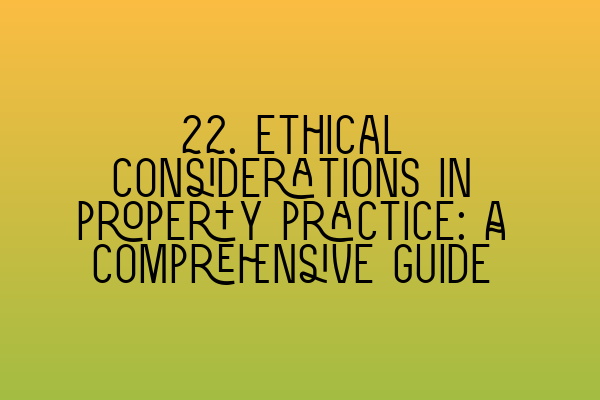22. Ethical Considerations in Property Practice: A Comprehensive Guide
When it comes to property practice, there are numerous ethical considerations that solicitors must take into account. These considerations not only ensure that solicitors maintain professional integrity but also protect the interests of their clients. In this comprehensive guide, we will explore the key ethical considerations that every property practitioner should be aware of.
1. Confidentiality and Client Privacy
Confidentiality is a fundamental principle in legal practice, and it is especially crucial in property transactions. Solicitors are entrusted with sensitive information about their clients and their transactions. It is essential to maintain confidentiality throughout the process, protecting the privacy and interests of your clients.
For example, when serving as a solicitor for a buyer, you should only disclose information as authorized by the client or required by law. This includes sharing information during negotiations, reviewing contracts, or conducting due diligence. Remember, clients may rely on your expertise to protect their interests, and breaching confidentiality can have serious consequences.
2. Conflict of Interest
As a property solicitor, you may encounter situations where potential conflicts of interest arise. It is your responsibility to identify and address these conflicts promptly to prevent any compromise in your ability to provide unbiased, objective advice to your clients.
For instance, if you represent both the buyer and the seller in a transaction, there is a conflict of interest as the interests of both parties may differ. In such cases, it is essential to seek informed consent from all parties involved, explaining the potential risks and implications. If the conflict cannot be resolved, you may have to withdraw from acting for one or both parties.
To learn more about conflict of interest and how to handle it effectively, check out SQE 1 Practice Mocks FLK1 FLK2.
3. Professional Competence
As a property solicitor, you must possess the necessary skills, knowledge, and experience to provide competent advice to your clients. It is essential to stay up-to-date with changes in property law, regulations, and procedures to ensure you are well-equipped to handle various property matters.
Continuing professional development is crucial for property practitioners, enabling you to enhance your expertise and stay abreast of industry developments. By investing in SQE 2 Preparation Courses, you can further develop your skills and demonstrate your commitment to professional competence.
4. Honesty and Integrity
Honesty and integrity are fundamental in property practice. As a solicitor, you must provide accurate and truthful information to your clients. This includes disclosing all relevant facts, risks, and potential outcomes, helping clients make informed decisions.
It is important to avoid any form of misrepresentation, whether it be about property details, transactional information, or legal implications. By maintaining a high level of honesty and integrity, you build trust with your clients and establish a solid professional reputation.
5. Managing Client Funds
When handling client funds in property transactions, solicitors must adhere to strict ethical guidelines. It is crucial to keep client funds separate from your own and handle them responsibly and transparently.
Ensure that you have appropriate systems in place to record and track client money. This includes promptly paying and accounting for any interest earned on client funds. By implementing robust financial controls, you can protect your clients’ funds and ensure compliance with ethical standards.
6. Avoiding Money Laundering and Fraud
Money laundering and fraud are significant concerns in property practice. Solicitors must make thorough assessments of their clients and transactions to detect and prevent potential illegal activities.
By implementing effective anti-money laundering procedures, such as conducting due diligence checks, verifying client identities, and reporting suspicious transactions, you can contribute to the fight against financial crime. Staying up-to-date with SRA SQE Exam Dates will ensure that you are aware of the latest regulations and requirements.
Conclusion
Property practice requires solicitors to navigate complex legal and ethical considerations. By understanding and adhering to these ethical principles, you can ensure the integrity of your practice while providing clients with the highest level of service.
Remember, maintaining client confidentiality, managing conflicts of interest, continuously developing your professional competence, upholding honesty and integrity, managing client funds responsibly, and preventing money laundering and fraud are all vital aspects of ethical property practice.
For more guidance and preparation, explore our resources on SQE 1 Practice Exam Questions and consider enrolling in our SQE 1 Preparation Courses.
